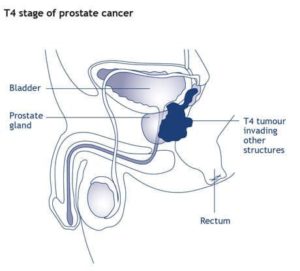 Overview
Overview
The prostate is a gland in the male reproductive system. Located just below the bladder (the organ that collects and empties urine), and in front of the rectum. It is about the size of a walnut and surrounds part of the urethra (the tube that empties urine from the bladder. The prostate gland produces fluid that makes up part of the semen.
Prostate cancer is found mainly in elder men. As men age, the prostate may get bigger and block the urethra or bladder. This may cause difficulty in urination or can interfere with sexual function. The condition is called benign prostatatic hyperplasia, although it is not cancer, surgery may be required to remove it. The symptoms of benign prostatic hyperplasia or of other problems in the prostate may be similar to symptoms for prostate cancer.
Although several cell types are found in the prostate, almost 99% of prostate cancers develop from the glandular cells. Glandular cells make the seminal fluid that is secreted by the prostate. The medical term for a cancer that starts in glandular cells is Adenocarcinoma. Because other types of prostate cancer are so rare.
Most prostate cancers grow slowly. Some prostate cancers, however can grow and spread quickly.
Risk factors
Age – The chances of having prostate cancer increases after age 50. Majority of prostate cancers are diagnosed in men above 65 years of age.
Race – Prostate cancer is found more widely in African-American men. Prostate cancer occurs less frequently in Asian men as compared to European or white men.
Family history – Hereditary factors play a role in the development of prostate cancer.
Diet – Men having high fat diets are more likely to develop prostate cancer
Signs and Symptoms
Weak or interrupted flow of urine.
Frequent urination.
Difficulty urinating.
Pain or burning during urination.
Blood in the urine or semen.
Nagging pain in the back, hips or pelvis.
Painful ejaculation.
Diagnosis as per modern science
Digital rectal exam.
Prostate specific antigen tests.
Trans rectal ultrasound.
Biopsy.
CT Scan.
MRI.
Staging
Stage I – The cancer is still confined to the prostate and has not spread to lymph nodes or elsewhere in the body.
Stage II – The cancer is still within the prostate and not spread to the lymph nodes or elsewhere in the body. It can be felt on digital rectal exam or seen on transrectal ultrasound.
Stage III – The cancer has begun to spread outside the prostate and may have spread to the seminal vesicles, but it has not spread to the lymph nodes.
Stage IV – It has spread to other, more distant sites in the body.

 Overview
Overview